Incidence of tx-emergent small-cell neuroendocrine prostate cancer 17 percent among those with mCRPC
WEDNESDAY, July 11, 2018 (HealthDay News) — The incidence of treatment-emergent small-cell neuroendocrine prostate cancer (t-SCNC) is 17 percent among patients with metastatic castration-resistant prostate cancer (mCRPC), and many t-SCNC biopsy specimens have androgen receptor (AR) amplification and protein expression, according to a study published online July 9 in the Journal of Clinical Oncology.
Rahul Aggarwal, M.D., from the University of California in San Francisco, and colleagues performed metastatic tumor biopsy of 202 patients with progressive mCRPC. The specimens underwent independent, blinded pathology review and RNA/DNA sequencing.
The researchers found that there was a 79 percent biopsy evaluable rate. The overall incidence of detection of t-SCNC was 17 percent. Of t-SCNC biopsy specimens, AR amplification and protein expression were present in 67 and 75 percent, respectively. The proportions of t-SCNC detected were similar in bone, node, and visceral organ biopsy specimens. There was nearly mutual exclusivity for genomic alterations in the DNA repair pathway with t-SCNC differentiation. Among patients with prior AR-targeting therapy for mCRPC, detection of t-SCNC correlated with shortened overall survival (hazard ratio, 2.02). A small-cell-like cluster that further enriched for adverse survival outcomes was identified in unsupervised hierarchical clustering of the transcriptome (hazard ratio, 3.00). In multiple external datasets, a t-SCNC transcriptional signature was developed and validated with >90 percent accuracy.
“t-SCNC is present in nearly one-fifth of patients with mCRPC and is associated with shortened survival,” the authors write.
Several authors disclosed financial ties to the pharmaceutical industry.
Abstract/Full Text (subscription or payment may be required)
Copyright © 2018 HealthDay. All rights reserved.








